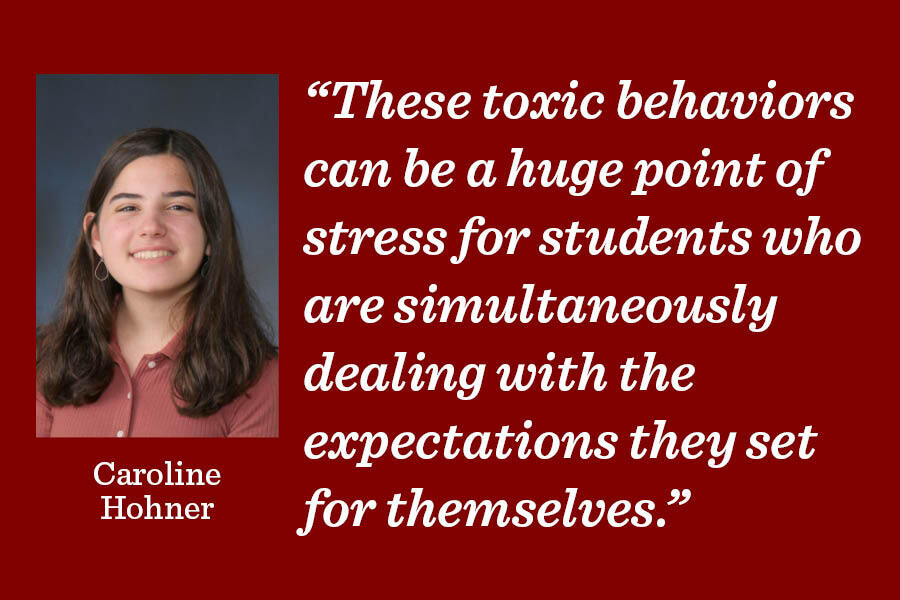Parents should not be granted unrestricted Schoology access
Parents want the best for their kids, but sometimes their well-meaning support can turn toxic, says reporter Caroline Hohner.
April 28, 2020
Parents want what’s best for their kids. For some parents, this means doing whatever they can to ensure their child’s academic success. Oftentimes, U-High parents choose to involve themselves in their kids’ daily lives through Schoology, the online service that connects U-High students and teachers. This support can manifest as anything from informed support if needed to gentle reminders about homework, and, in extreme cases, stifling “helicopter parent” behavior. With students learning in close proximity to parents and feeling the stress of the COVID-19 pandemic, these behaviors can be more damaging than ever to students’ work ethics and mental states.
As of now, parents can view almost everything a student can access on Schoology, except for administrative documents labeled “private.” During the remote learning period, Schoology has become the main bridge between students and teachers. As more resources and assignments are posted online, parents are further enabled to involve themselves in their students’ work through unhealthy behaviors.
U-High should limit parents’ access to Schoology, as unrestricted access enables “helicopter parenting” that increases stress and limits students’ opportunities for independence.
This period has also introduced new sources of stress for students, and working from home has no doubt impacted student motivation. At a time when students are especially vulnerable, it is important to alleviate any unnecessary forms of pressure.
It can be argued that this change would harm students, as it could take away the support parents can offer their kids by reminding them of their upcoming assignments and due dates. On the contrary, this role can be filled just as efficiently by Schoology’s app notification system, which students can customize to send messages to their phone each time an assignment or update is posted. Students who need extra support with task management, especially now that the structure of an in-person school day has been stripped from them, could still voluntarily turn to their parents for help, or contact their adviser, counselors or trusted teachers.
Given restricted access to Schoology, misguided parents might be inclined to scrutinize each assignment and act as a disruptive force in their students’ lives, providing constant, unhelpful “reminders” and developing an over-inflated sense of self-importance concerning their students’ education. These toxic behaviors can be a huge point of stress for students who are simultaneously dealing with the expectations they set for themselves.
According to the 2019 wellness survey, an average U-High student would rate their stress level at a 6.7 (out of 10). Additionally, 70% of high schoolers reported their main source of stress as their school work. With this high amount of pressure being put on students, we should be making all the changes possible to alleviate it.
Every high school student should learn to manage their time and keep track of their workload independently. When parents feel inclined to involve themselves in their students’ class work, they rob their students of the opportunity to develop an independent sense of motivation and the organizational skills needed for high school, college, and beyond.
To help our students thrive during the online learning period and once classes resume in person, the administration should limit parents’ access to their students’ specific assignment details and homework updates, while maintaining parent access to class materials and group posts. These suggested changes will allow parents to still be able to be connected to their students’ school career while putting in place boundaries to stop the rotors of “helicopter parents” and alleviate this aspect of the stress that comes with a high-school workload.
Parents want the best for their kids, but sometimes their well-meaning support can turn toxic. High-schoolers also want what’s best for themselves: the space to grow and succeed independently.





























































Leeann Zouras • Apr 29, 2020 at 2:18 pm
Hi,
Thanks for your column. As a parent, I largely agree with your opinion. We should not be managing the academic lives of our high schoolers.
However, some Schoology items are appropriate to share, such as the daily bulletin and information distributed by Ana Campos about social, volunteer and work opportunities. I found the latter particularly useful as the parent of a transfer student, because I was unfamiliar with all the high school had to offer.
Thanks,
Leeann Zouras